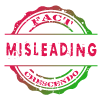A viral claim circulates that dandelion root extract wipes out 95–96% of cancer cells in 48 hours, especially leukemia and colon cancer, without harming healthy cells. However, our fact check found that this claim is inaccurate.
Social Media Posts
Multiple social media users have shared claims that dandelion root effectively kills 95% of cancer cells.
Fact Check
Where did “95% in 48 hours” come from?
A Canadian research team found that a water-based dandelion root extract (DRE) caused cell death in more than 95% of colon cancer cells within 48 hours in laboratory tests (not in human patients). In the same study, they observed slower tumor growth in mice, but didn’t demonstrate cures in humans. The result does not come from leukemia experiments and does not demonstrate effectiveness in patients. (Source)
What do leukemia studies actually show?
A 2012 laboratory study found that dandelion root extract can trigger self-destruction (apoptosis) in certain leukemia cells, while mostly sparing normal blood cells. These results came only from laboratory dishes (in vitro), not from human patients, and used carefully controlled concentrations. It’s important to note that these findings don’t match the viral “95% of cancer cells killed in 48 hours” claim for leukemia. The actual results showed different effects depending on the dose and timing, with some experiments requiring multiple treatments to be effective. To date, there are no completed clinical trials proving that dandelion root extract cures leukemia in humans. While Johns Hopkins researchers did report a single case where a patient with chronic myelomonocytic leukemia (CMML) improved while taking papaya leaf and dandelion root extracts, this type of individual case report cannot prove that the treatment caused the improvement.
Other Cancer Models
Research has also explored dandelion extract in prostate and gastric cancer models. A 2019 study found that cultured prostate cancer cells treated with DRE, longan seed extract (LGE), and conventional chemotherapy drugs responded better than with chemotherapy alone. In mice transplanted with human prostate cancer cells, those given food or water laced with extracts showed reduced tumor weight and volume.
Moreover, a 2017 study on gastric cancer suggested that compounds in dandelion root may target specific proteins that drive cell growth and migration, pointing to possible mechanisms of action. These results expand the scientific interest in DRE, but again, they remain preclinical, lab and animal data, not human proof. (Source)
Laboratory vs. Human Safety
In lab experiments, dandelion root extract (DRE) showed a preliminary findings suggest DRE may target cancer cells while causing less damage to healthy cells (like colon lining cells and normal blood cells). While this selective effect is encouraging, it’s important to understand that positive results in lab dishes often don’t translate to safe, effective treatments in human bodies. Cancer Research UK has warned that herbal supplements can interfere with cancer medications, and the scientists studying dandelion root have explicitly cautioned that patients should not abandon proven cancer treatments in favor of dandelion products.
Expert Comments
Memorial Sloan Kettering (MSK) notes that while dandelion root extract has shown anticancer activity in laboratory tests with melanoma, leukemia, pancreatic, and colorectal cancer cells, these effects are strictly preclinical. They emphasize that dandelion may cause allergic reactions and interact with medications.
Verywell Health also confirms that despite dandelion’s nutrient-rich profile and traditional claims, scientific evidence remains limited to laboratory and animal studies, with no validation for human cancer treatment. They also caution about potential drug interactions and allergic reactions.
Furthermore, Health.com also echoes these concerns, noting that while early research suggests dandelion may reduce inflammation and potentially affect tumor growth, human clinical trials are still needed. They similarly highlight possible side effects and medication interactions.
Traditional Use
Dandelion has been used in traditional medicine across Europe, Asia, and North America for centuries. The root and leaves serve as a diuretic, aid digestion, and support liver and gallbladder function according to historical texts. These applications continue in contemporary wellness practices.
Traditional use, however, does not constitute medical evidence for cancer treatment. General wellness remedies fundamentally differ from treatments for serious diseases like leukemia or colon cancer. The transition from folk remedy to cancer treatment lacks scientific validation. Despite ongoing pharmacological interest in the plant, clinical trials have not established its efficacy as a cancer therapy.
Conclusion
Based on our fact-checking, the claim that “dandelion root kills up to 95% of cancer cells within 48 hours” is misleading. While laboratory studies have shown preliminary results in test tubes and mice, these findings have not been validated in human clinical trials. The dandelion extract research remains in early experimental stages, and medical experts caution against using it as an alternative to proven cancer treatments. At present, no reputable cancer organization endorses dandelion root as a treatment.







